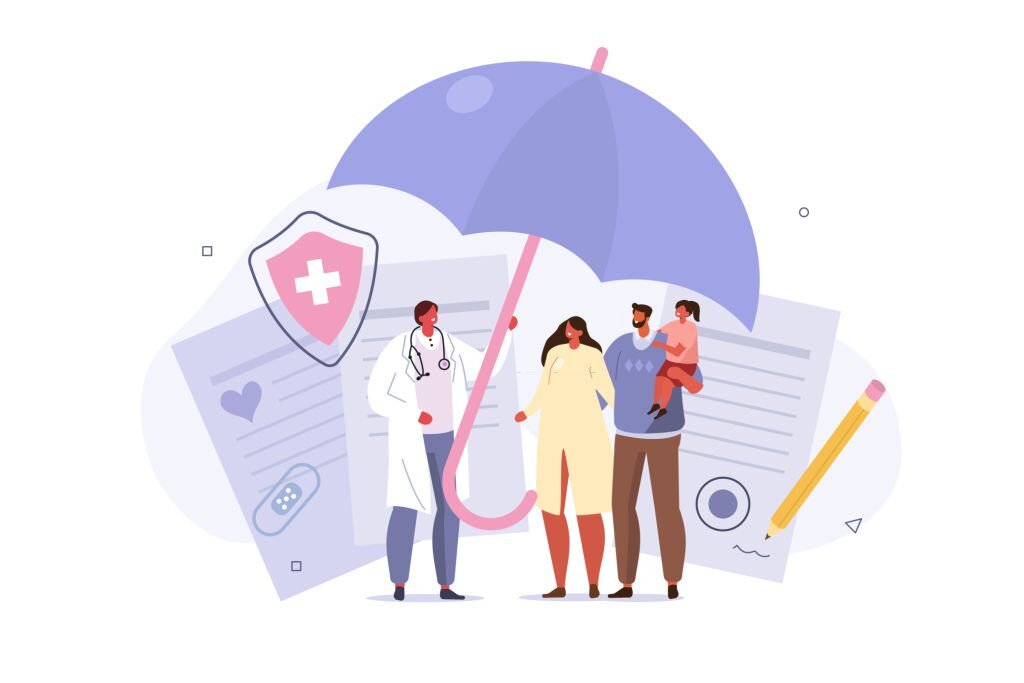Insurance has traditionally been driven by middlemen. Although removing them entirely may be unrealistic, reducing their involvement will naturally increase profit margins.
The mobile apps for insurance agents and users enable direct B2C interaction without the use of intermediaries. The positivity also permeates the customer experience, which should never be overstated. And insurtech would be too smart for its own good not to investigate this possibility.
There are three major components that contribute significantly to the formation of an insurance company.
This includes the insurer, which incorporates and markets financial products, as well as third-party entities that provide the insurer’s covered services. The third type is the end-user, or the customer who has chosen to be insured.
Given the diverse nature of operations, insurance products such as mobile apps for insurance agents and customers maintain a touch of finesse. Customer satisfaction, user engagement, and increased sales are all aided by mobile insurance apps. There are numerous additional advantages for insurance companies to invest in mobile app development.
Mobile insurance solution provide the following benefits to insurance companies and/or customers, as applicable:
1. Enhances Convenient Services
One of the most common challenges of those in the finance-frontline is client visits. This could be either for background checks or personal form submission or a routine update of information. Be that as it may, some situation or prevailing condition may not permit face-to-face meeting of the insurance company and the customers, for instance in a period of crisis like COVID-19.
Moreover, the coronavirus onset has led to a rise in demand for insurance applications. So this provides us with sufficient facts to state that insurance app development is all you need to initiate growth in your insurance business. You might want to look into the detailed process of mobile app development to access technical insights.
2. Boosts User Reach
Good customer service and converting customers into business partners are priorities for experts. Referral programs can bring in more buyers if your mobile insurance solutions are cutting-edge. There are two advantages to doing so. First, shortening customer recruitment cycles would free up time for insurance agents to focus on larger, more profitable clients. Second, you can use semantic marketing to target more customers by advertising your mobile insurance platform in related apps.
3. Makes Contact with Customers
The digital transformation of the insurance landscape has played a critical role in expanding insurance companies’ overall market reach and connecting with customers who are unlikely to visit their branch office. In today’s fast-paced world, few people have time to visit an insurance office, talk to the agents there, and then invest in a plan. Modern customers want faster alternatives to such traditional activities, so incorporating mobile apps into insurance companies’ salesforces is critical.
Customers can now easily purchase the policies of their choice directly from their mobile device, without ever having to step foot inside an insurance firm’s office. This ease of use encourages a large number of people to invest in insurance.
Buyers are more cost-conscious than ever before. According to statistics, 85 percent of customers conduct online research before making a purchase. Insurance mobile apps do an excellent job of convincing people that they need immediate assistance.
According to one study, up to 63 percent of its sample population would prefer to communicate with a chatbot. As a result, we believe registered policyholders will prefer to download and track policies over mobile. Based on this, they can compare multiple products and shortlist the ones with the best features.
4. Examines Customer Data
The insurance industry can use mobile analytics to analyze data to a greater extent than ever before. Structured data of the following types can be easily gathered by insurance applications:
- Identity Data – This includes your name, date of birth, physical address, phone number, email address, and/or links to social media profiles like Facebook, Twitter, and LinkedIn.
- Quantitative Data – Transactional data such as bank account information, credit score, payment frequency, and so on.
- Descriptive Data – Insurers may require customers to disclose property information, car ownership, professional status, educational background, and family tree.
- Qualitative data consists of subjective/behavioral details such as favorite color, hobbies, and so on.
- Companies in the insurance industry that collect such vivid information can then filter the best-fit prospects for upselling.
5. Improves ROI and Customer Satisfaction
It has been reported that mobile customers tend to invest in more products from their financial institutions than branch-only customers. One of the primary reasons for this is that mobile customers are far more engaged with their insurance companies and services. The advantages of 24-hour availability and immediate fulfillment of customer needs play a significant role in persuading customers to purchase additional insurance products. Certain insurance companies even provide app-only discounts and risk-management plans to encourage customers to purchase more insurance plans while ensuring their maximum satisfaction.
6. Makes Claim Processing Easier
The digital transformation of the insurance industry, particularly the introduction of insurance applications, has made the process of filing claims much more convenient and seamless. This not only makes insured people’s lives easier and ensures optimal customer convenience, but it also significantly aids in reducing their workloads and freeing up their time. As a result, insurance agents can use their spare time to acquire more customers and engage with them, increasing the insurance company’s business prospects.
7. It is more environmentally friendly.
Taking steps toward environmentally sustainable methods is an urgent need for all business organizations. Rapid mobile adoption in the insurance industry contributes significantly to this. Insurance companies can significantly reduce paper consumption by automating multiple insurance tasks, such as policy purchase, renewal, and claim, through an online platform. They can easily store client information, claim records, and other important documents digitally.
Furthermore, storing files digitally is safer than using a traditional filing system.
Modern, innovative tech-enabled tools have enabled insurance firms to rapidly conceptualize and launch products, while also seeing a return on their ideas and investment sooner. The field of mobile applications has now established a prominent position.
Modern, innovative technology-enabled tools have enabled insurance companies to rapidly conceptualize and launch products, while also seeing a return on their ideas and investment sooner. Making a prominent appearance, the field of mobile applications has now become mandatory for all insurance providers.









